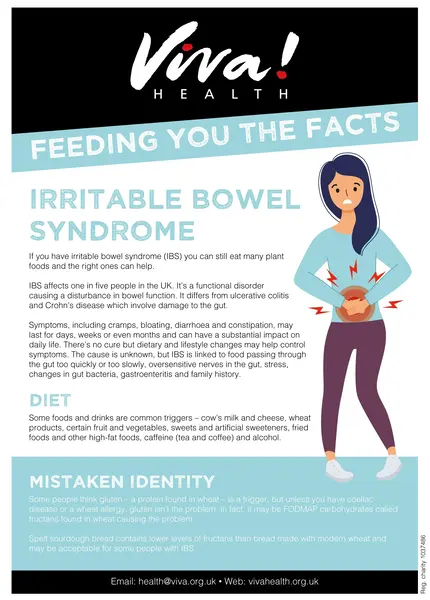Mini factsheet: IBS

Irritable bowel syndrome
If you have irritable bowel syndrome (IBS) you can still eat many plant foods and the right ones can help.
IBS affects one in five people in the UK. It’s a functional disorder causing a disturbance in bowel function. It differs from ulcerative colitis and Crohn’s disease which involve damage to the gut. Symptoms, including cramps, bloating, diarrhoea and constipation, may last for days, weeks or even months and can have a substantial impact on daily life. There’s no cure but dietary and lifestyle changes may help control symptoms. The cause is unknown, but IBS is linked to food passing through the gut too quickly or too slowly, oversensitive nerves in the gut, stress, changes in gut bacteria, gastroenteritis and family history.
Diet
Some foods and drinks are common triggers – cow’s milk and cheese, wheat products, certain fruit and vegetables, sweets and artificial sweeteners, fried foods and other high-fat foods, caffeine (tea and coffee) and alcohol.
Mistaken identity
Some people think gluten – a protein found in wheat – is a trigger, but unless you have coeliac disease or a wheat allergy, gluten isn’t the problem. In fact, it may be FODMAP carbohydrates called fructans found in wheat causing the problem. Spelt sourdough bread contains lower levels of fructans than bread made with modern wheat and may be acceptable for some people with IBS.
The low-FODMAP diet
‘FODMAP’ stands for: fermentable, oligosaccharides, disaccharides, monosaccharides and polyols. They are a group of carbohydrates that are poorly absorbed and rapidly fermented in the guts of some people. In people with IBS, instead of being absorbed, FODMAPs draw water towards them in the small intestine, which can have a laxative effect, or continue on to the large intestine where gut bacteria ferment them, giving rise to excessive gas. The extra water and gas cause bloating and discomfort.
Although many pulses, grains, fruit and veg containing FODMAPs are on the restricted list, many aren’t. You can find lists of low- and high-FODMAP foods online. The aim is not to eliminate all FODMAPs but to assess the impact of each one and find a comfortable intake as part of a balanced diet. It’s effective for many people with IBS but should be done under the guidance of a registered dietician (your GP can refer you).
You don’t have to avoid all carbs – you can eat rice, corn pasta, quinoa, polenta and potatoes. Acceptable vegetables include broccoli, carrots, courgette, butternut squash, cucumber, aubergine, lettuce and red peppers. Onions and garlic are triggers for many but can be replaced with chives or the green part of spring onions. Pulses (peas, beans and lentils) can be a problem but tofu and tempeh are acceptable. If nuts are a problem, you may be able to eat seeds including up to one tablespoon of ground flaxseeds daily, which may help reduce symptoms. Maple syrup is a low-FODMAP sweetener and bananas, blueberries, grapes, kiwis, oranges, pineapples, raspberries, strawberries and coconut are low-FODMAP. Almond and hemp milks are low-FODMAP, oat milk counts as low-FODMAP in small (125ml) servings.
Take-home message
Don’t skip meals or eat too quickly, avoid alcohol and fizzy drinks and swap tea and coffee for herbal tea. Cook with fresh ingredients, avoiding fatty and processed foods. Find time to relax – meditation, yoga, better sleep patterns and regular exercise may help manage anxiety and alleviate IBS symptoms.
No single solution works for everyone but there are lots of things that you can try to find out what works for you.
This post has been categorised in: All Print Materials, Mini factsheets, Resources





